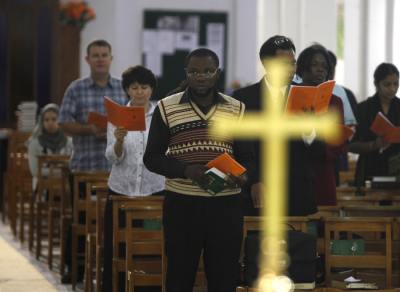Arrests and Torture of Christians Continues in Libya

Arrests continue of Christians accused of proselytizing in Libya, with a total of seven now known to be in custody including one reported to have been tortured, sources said.
Four expatriate Christians in the eastern coastal town of Benghazi were arrested on Feb. 10, accused of proselytizing. Libya's Preventative Security Unit arrested the Egyptian, South African, Korean and dual Swedish-American Christians, who have yet to be officially charged.
On Feb. 13, Preventative Security officers picked up two more Egyptian Christians, and another Egyptian Christian was arrested by Feb. 16, sources said. All the detainees were being held in Benghazi. It was unclear what led to their arrests.
Preventative Security spokesman Hussein Bin Hmeid said in a statement to Reuters that the four Christians originally arrested were printing books calling for conversion to Christianity. He said the country is 100 percent Muslim and that proselytizing "affects our national security."
Only one of the four arrested on Feb. 10, Sherif Ramses of Egypt, has been publicly identified. When Ramses was arrested, he allegedly had 30,000 Bibles in storage, a figure that Libyan police inflated to 45,000 in published statements, sources said. Ramses ran a small printing service in Benghazi and a bookstore that sold both Christian and secular books.
Sources close to the arrests told Morning Star News that Ramses has been tortured, saying he was severely bruised. Several other sources independently told Morning Star News that Preventative Security was able to get the names of other Christians in Libya from Ramses, possibly by accessing information on his cell phone. It was unclear, however, if any Christians subsequently detained had any significant links to Ramses' work.
Preventative Security is an internal police force formed during the Libyan Revolution by regional rebel leaders.
Rumors were circulating throughout Libya about unknown others thought to be arrested.
Another wave of arrests was said to have taken place on Sunday (Feb. 17) in Tripoli. Sources in Libya reported to contacts in Egypt that no one has been able to contact these detainees, learn their location or even get an estimate of the number of those said to be arrested.
"They say it was a large group," a source in Cairo receiving updates from Libya said. "They were supposed to be released, but there has been no word."
There has been no information about the possibility of Libyan nationals being picked up in any of the expatriate sweeps.
Those monitoring the situation said that they thought all the detainees would be released except for Ramses, who will likely stand trial. It was unclear what penalty a guilty verdict would bring for Ramses, as the proselytizing law is a hold-over from the previous regime deposed in October 2011, and Libya has yet to approve a new constitution. When arrested and asked why he thought he could hand out Bibles in Libya, Ramses reportedly told his captors, "They say Libya is supposed to be a free country."
The arrests are the latest in a series of recent incidents in Libya against Christians or Christian symbols. In December, two Egyptian Christians were killed and two were wounded when suspected Islamic extremists threw a homemade bomb into a Coptic Orthodox Church building in Dafniya, in western Libya. Several communities of Catholic nuns left Cyrenaica Province after receiving credible death threats. In addition, on many occasions suspected Islamic militants have desecrated graves with crosses on them of Britain's World War II dead.






















